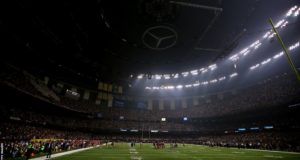|
Listen To The Article
|
 The blackout (or should we say blackouts), that occurred during Super Bowl XLVII have caused an uproar. Andrew Rafferty reported on NBC News that experts are saying this is a sign emphasizing the need for a “smart grid.” In the article Rafferty starts by saying, “While the reasons for the 34-minute power outage during Sunday’s Super Bowl remain largely unknown, advocates for a smarter energy grid say it is the latest example of why the nation needs desperately to invest in its electricity infrastructure.”
The blackout (or should we say blackouts), that occurred during Super Bowl XLVII have caused an uproar. Andrew Rafferty reported on NBC News that experts are saying this is a sign emphasizing the need for a “smart grid.” In the article Rafferty starts by saying, “While the reasons for the 34-minute power outage during Sunday’s Super Bowl remain largely unknown, advocates for a smarter energy grid say it is the latest example of why the nation needs desperately to invest in its electricity infrastructure.”
The Energy Independence and Security Act of 2007 defines a “smart grid” as being, “a modernization of the electricity delivery system so that it monitors, protects, and automatically optimizes the operation of its interconnected elements – from the central and distributed generator through the high-voltage transmission network and the distribution system, to industrial users and building automation systems, to energy storage installations, and to end-use consumers and their thermostats, electric vehicles, appliances, and other household devices.”
This not only appears to be a definition, but also a list of priorities. Read through that definition again. Who is at the end of this list of priorities? The end-user.
You.
It allows the power company to control the distribution of power through their grid. This means that had New Orleans been operating on a smart grid, they could have taken power away from the people watching at home to redirect more power to the Superdome.
Why should someone have that much power? Who are they to determine who can have power and who cannot at any given point in time? Each paying customer should be treated the same.
Massoud Amin, a professor at The University of Minnesota, is viewed as an expert on the U.S. electrical grid. He says, “You’re dealing with an aging infrastructure that is not made for this century’s demands.”
We also define our roadways as infrastructures. When our roadways start decaying, what happens? They don’t start limiting who can travel on the roads. They don’t regulate. They calculate. They determine how many motor vehicles see a road throughout a period of time and calculate when a road should be improved and to what grade the road should be improved to.
Why can’t the power companies do that? Why should they be different? Shouldn’t they calculate the growing need for power and add support to the infrastructure or add necessary improvements that won’t impede on our individual freedoms?
According to Amin, “It’s not to say the sky is falling. When these things happen they bother us. The problem we should worry about is when they become more than just a bother.”
Bill Heid, founder of Off The Grid News states, “This is why we advocate having a backup source of power that is not connected to the power grid in any way. With the fear of more energy restrictions, the threat of a smart grid, and the crazy weather we have been having lately, it is becoming increasingly important to have a sustainable source of backup power.”
To listen to our interview with Jennifer Stahl, a lady who was arrested for protesting against the city of Naperville, IL placing a smart meter on her home, click here.
 Off The Grid News Better Ideas For Off The Grid Living
Off The Grid News Better Ideas For Off The Grid Living



